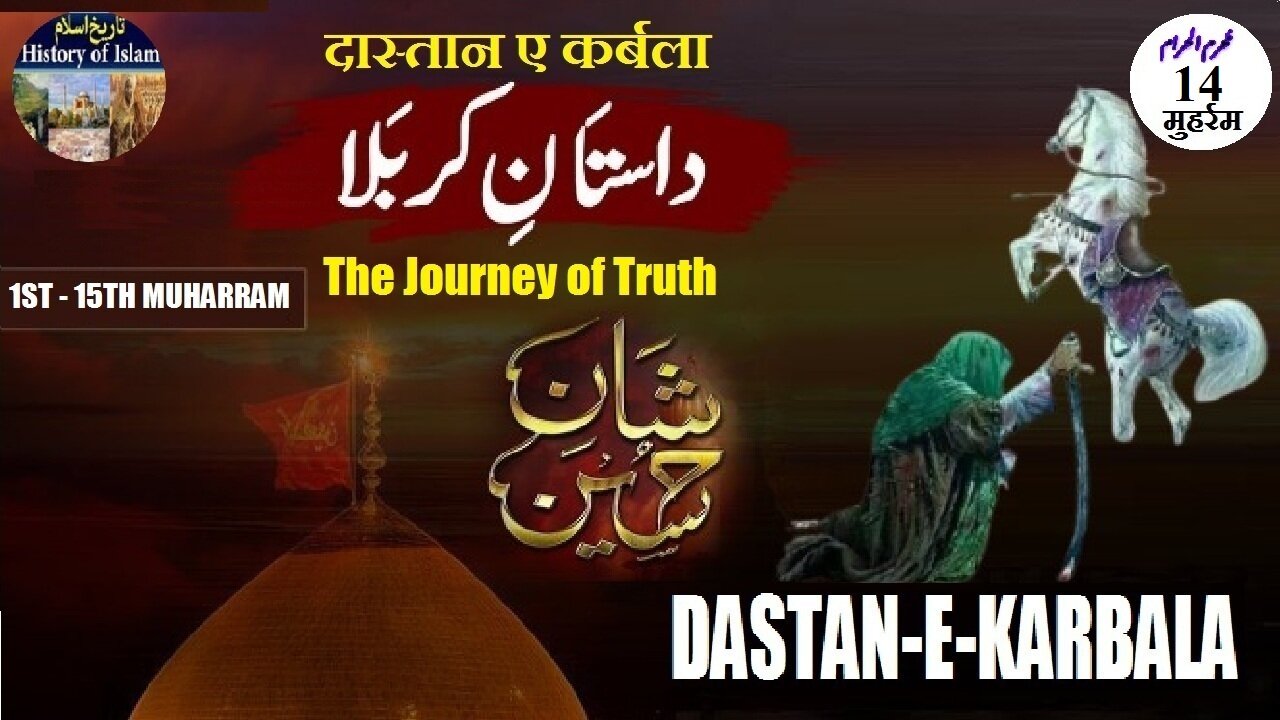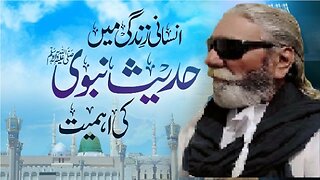Premium Only Content

14th Muharram Dastan-e-Karbala मुहर्रम दास्तान-ए-कर्बला چودھویں محرم الحرام داستانِ کربلا
@islamichistory813 #muharramalahram #muharram #karbala #dastanekarbala #journeyoftruth #imamhussain #ashura #shia #history #islamic #martyrs #karbala #story #hussain #islamic #sacrifice #shia #commemoration #karbala #lessons #1st #to 15th #muharram #truthofkarbala
14th Muharram Dastan-e-Karbala The Journey of Truth
Asslamoalaikum, The tragedy of Karbala is one of the most heart-wrenching and powerful chapters in Islamic history. Occurring in the sacred month of Muharram, this historic event marks the ultimate sacrifice of Imam Hussain (RA), the beloved grandson of Prophet Muhammad (SAW), who stood fearlessly against tyranny and injustice. On the plains of Karbala, in 61 AH (680 CE), Imam Hussain, along with his family and a small group of loyal companions, faced the brutal army of Yazid. Denied water, surrounded by enemies, and offered no escape, they chose martyrdom over surrender, preserving the values of truth, justice, and faith.
This video takes you through the sorrowful yet inspiring journey of Karbala—each day of Muharram carrying profound pain and unmatched bravery. From the departure of Imam Hussain from Madinah to the heart-shaking events of Ashura, we honor the legacy of those who gave their lives for Islam.
So sisters brothers friends and elders today we will be the described events of 14th Muharram in this video.
The 14th of Muharram marked yet another deeply sorrowful day in the shadow of the tragedy of Karbala. Though the swords had fallen silent and the cries of the battlefield had ceased, the pain of loss and injustice continued to echo across the sands of Karbala. The blood of **Imam Hussain (A.S)**, his family, and his companions had already soaked the earth four days prior, but the emotional and spiritual aftershocks were only beginning to be felt across the Muslim world. The 14th of Muharram carried the lingering weight of heartbreak, as the few who survived — the women, the children, and **Imam Zain-ul-Abideen (A.S)** — were enduring the first stages of their captivity, while the memories of their loved ones, still fresh, pierced their hearts with unbearable sorrow.
By this day, the bodies of the martyrs had been buried by the noble tribe of **Banu Asad**, with the help of the ailing but divinely guided **Imam Zain-ul-Abideen (A.S)**. The battlefield had transformed from a site of massacre into a sacred resting place for the greatest martyrs of Islam. Their graves, simple and unmarked at the time, were soaked in blood but surrounded by divine light. These were not just ordinary men who had died; they were the flagbearers of truth, the protectors of the Prophet’s message, and the defenders of Islam’s core values. The 14th of Muharram was a day in which the land lay still, but the spiritual energy of Karbala had begun to spread far beyond its physical borders.
In the camp of Yazid’s forces, there was no peace despite their apparent military victory. Many among them began to feel the weight of what they had done. The massacre of the Prophet’s family was not something that could be justified or ignored. Some soldiers were seen in tears, regretting their participation. Others had become haunted by the innocent faces of thirsty children and the sight of **Lady Zainab (S.A)** standing defiantly against the forces of tyranny. The sheer injustice of it all began to expose the true nature of Yazid’s regime, and the seeds of resistance were being planted in the hearts of those who had once remained silent.
Meanwhile, the **caravan of the captives** — led by **Lady Zainab (S.A)** and accompanied by **Imam Zain-ul-Abideen (A.S)** — continued its slow and painful journey towards **Kufa**. Bound in chains, without veils, and physically exhausted, they were treated like prisoners of war despite their noble status. Yet their courage never wavered. On the 14th of Muharram, as they moved further away from the sacred land of Karbala, their eyes remained fixed on the memory of their martyrs. Each step was filled with pain, but also with purpose. They knew that their suffering would become the voice of Karbala, and that their patience would carry the message of Hussain (A.S) to the world.
This day also marked the beginning of the **spiritual awakening** in the hearts of the Muslim Ummah. News of the tragedy had begun to spread — whispered in markets, discussed in homes, and mourned in the hearts of true believers. Those who had remained silent during Hussain’s call for support were now beginning to realize the weight of their mistake. The cries of regret, the sounds of mourning, and the prayers for forgiveness began to rise, quietly but steadily. The Ummah had begun to wake up, and the mission of Imam Hussain (A.S) was taking root — not through swords, but through **tears, remembrance, and awakening of conscience**.
The 14th of Muharram was a day of grief, reflection, and the first flicker of rebellion against tyranny. Though the battle was over, the message had just begun to rise. Karbala was not an end; it was the beginning of a revolution of hearts. The lessons of sacrifice, faith, and steadfastness would echo forever. And the world would remember: those who die for truth never truly die — they live eternally in the hearts of those who carry their mission forward.
As we remember the heartbreaking events of Karbala, let us not only remember the sacrifices of Imam Hussain (RA) and his companions, but also strive to embody their values ??of truth, justice, and unwavering faith. Their legacy is a timeless reminder that standing up against oppression is the duty of every believer. May their courage inspire us to live with dignity and righteousness. Amen.
Allah Hafiz
=========================
-
 7:50
7:50
ISLAMIC HISTORY
1 day agoIntroductory Words for Hadith Nabawi | Importance of the Prophetic (PBUH) Hadith in human life
16 -
 39:45
39:45
Kimberly Guilfoyle
2 hours agoCharlie's Legacy and Our Mission | Ep.253
12.3K10 -
 10:06
10:06
Tundra Tactical
2 hours agoWhats The Deal With New Guns In 2025 Part 2
81 -
 LIVE
LIVE
The Amber May Show
3 hours agoCharlie Kirk Murder Probe EXPLODES | FBI, FEMA, & SCOTUS Shake the Nation
154 watching -
 1:14:55
1:14:55
vivafrei
5 hours agoJD Vance Pays Tribute to Charlie Kirk; Ryan Routh Trial Continues! And More!
168K98 -
 LIVE
LIVE
Dr Disrespect
7 hours ago🔴LIVE - DR DISRESPECT - WARZONE - PROTECT THE DOC
1,034 watching -
 LIVE
LIVE
LFA TV
20 hours agoLFA TV ALL DAY STREAM - MONDAY 9/15/25
1,187 watching -
 29:05
29:05
Athlete & Artist Show
6 hours ago $0.23 earned1st Line Minutes at 35, Slovenian Sports Fans, and MORE
4.61K -
 LIVE
LIVE
freecastle
6 hours agoTAKE UP YOUR CROSS- Our Battles, HE Has Already Won!
103 watching -
 1:37:05
1:37:05
The Quartering
5 hours agoCharlie Kirk Assassination FBI Coverup, Liberals Getting Fired & Massive Vigils!
200K85